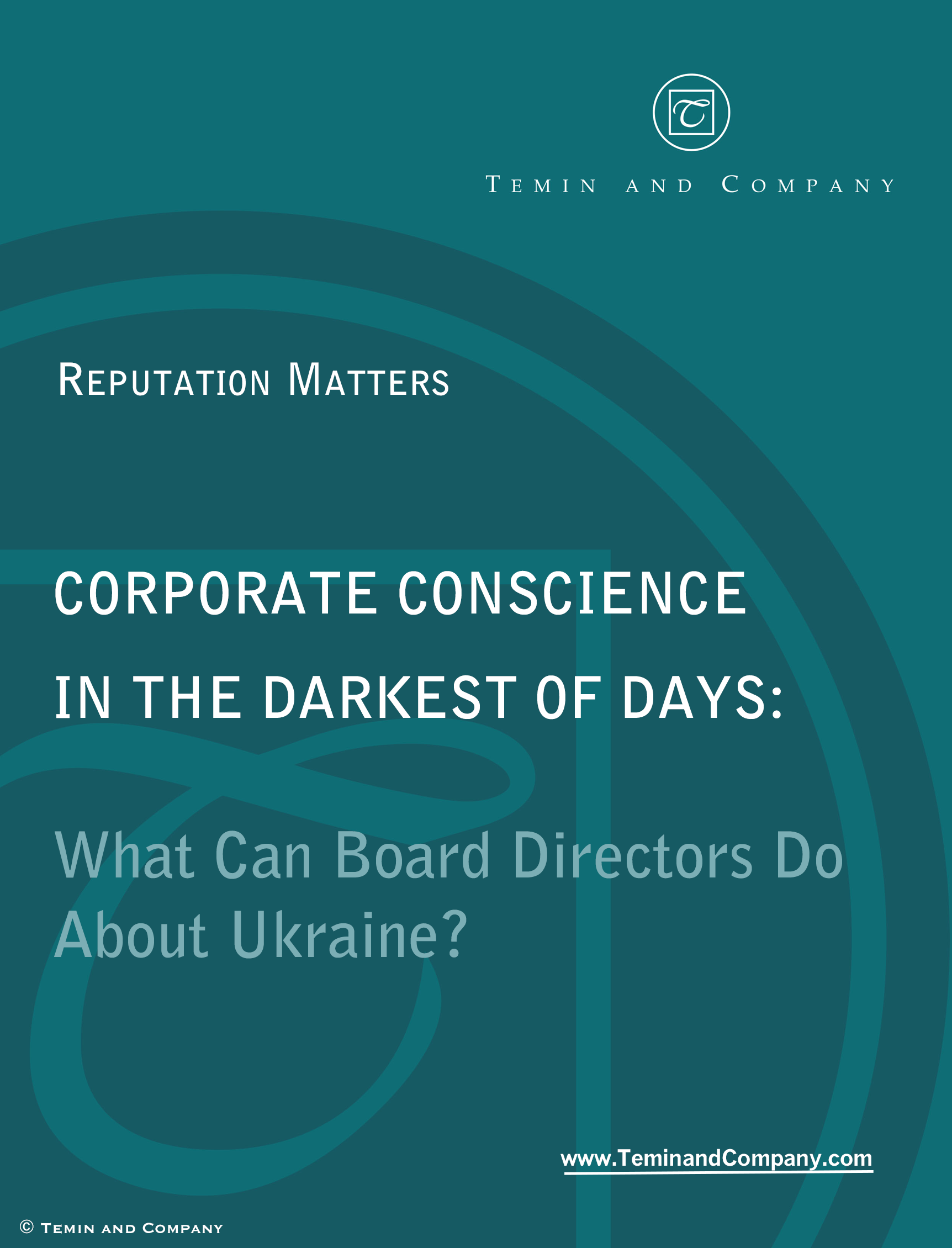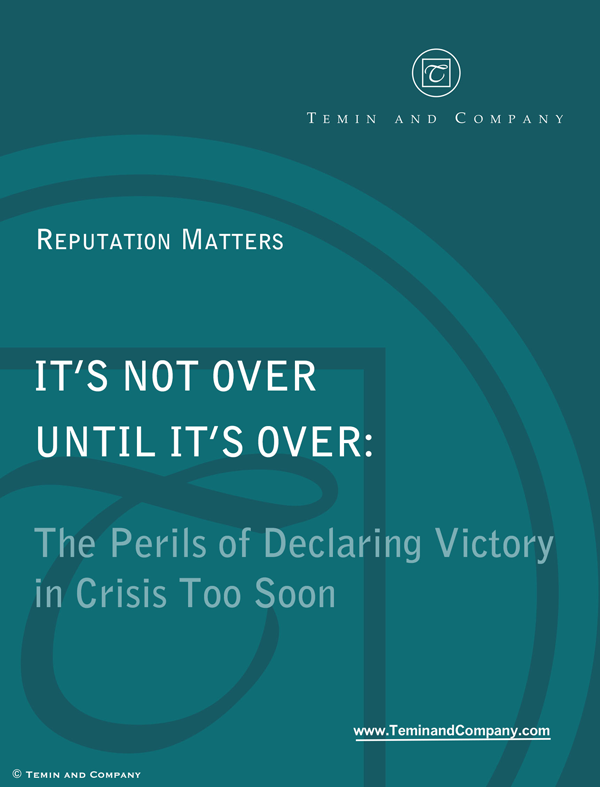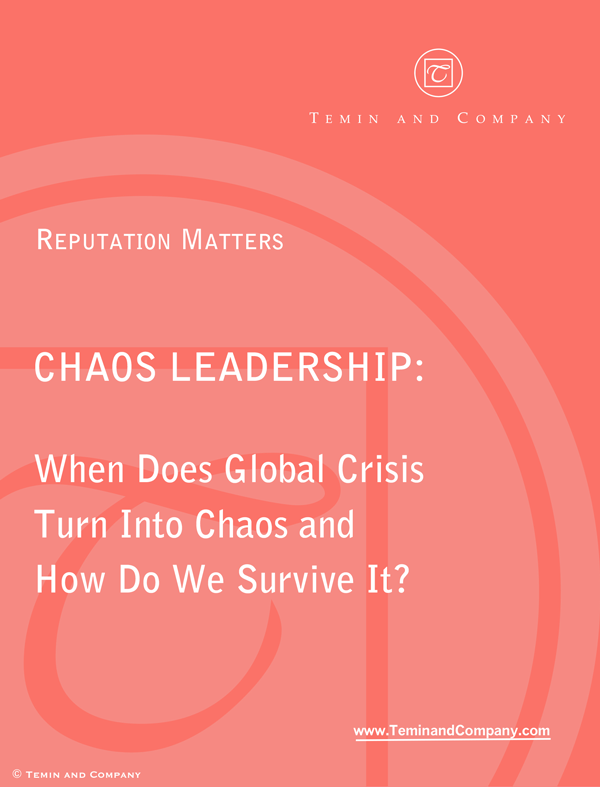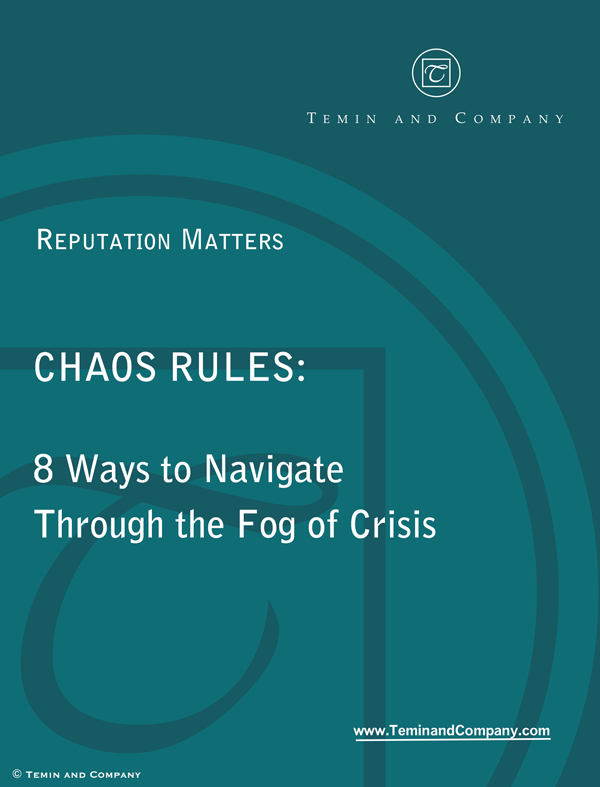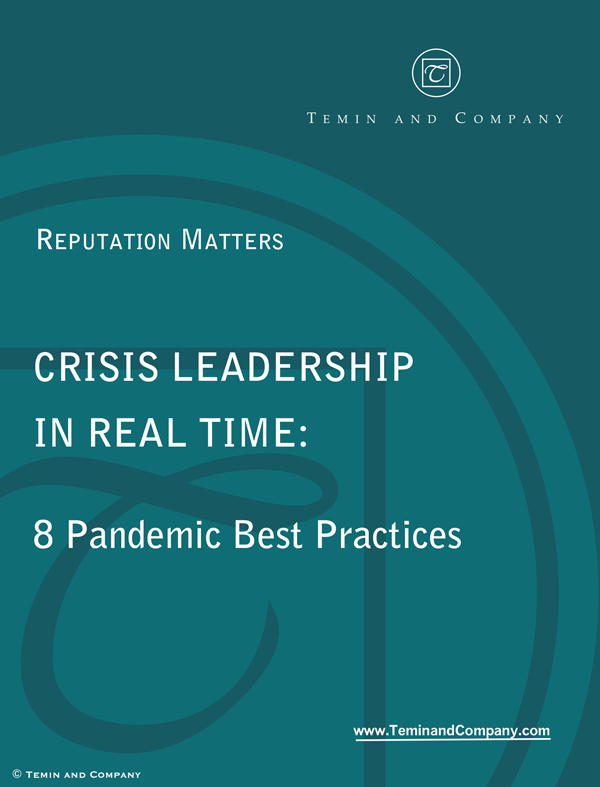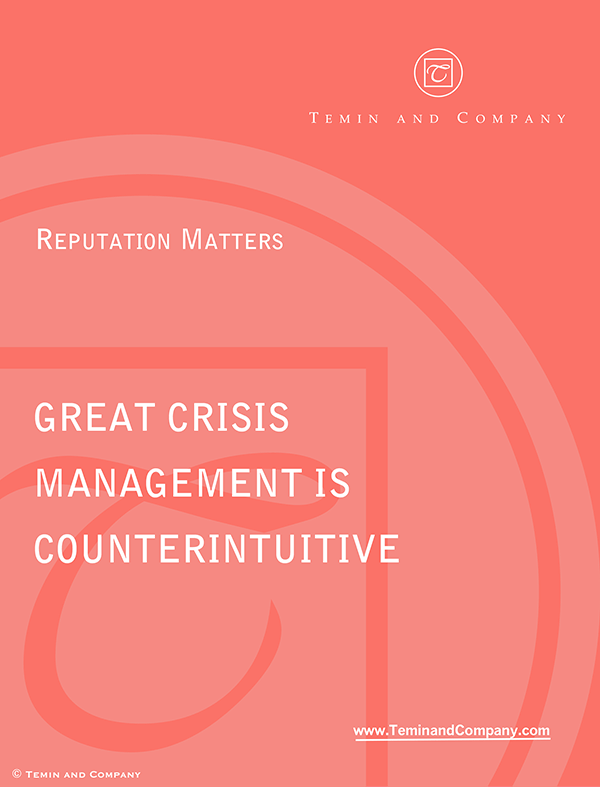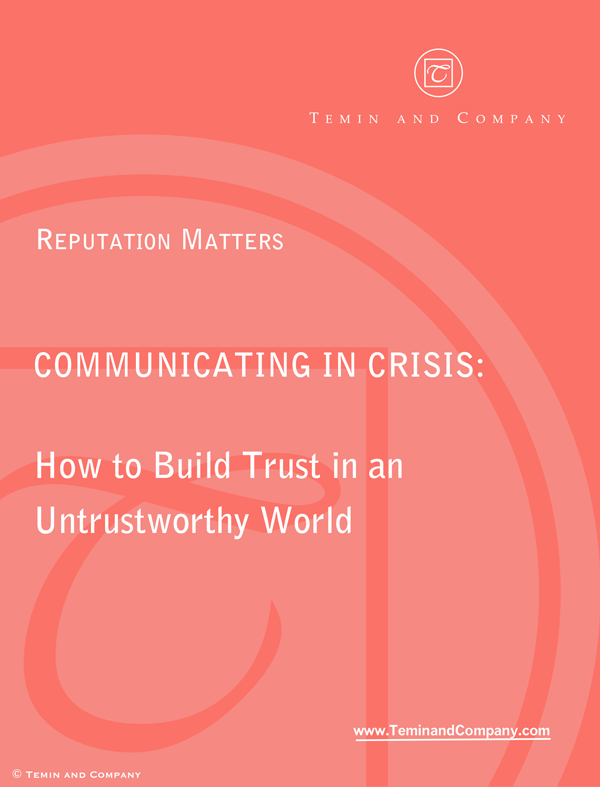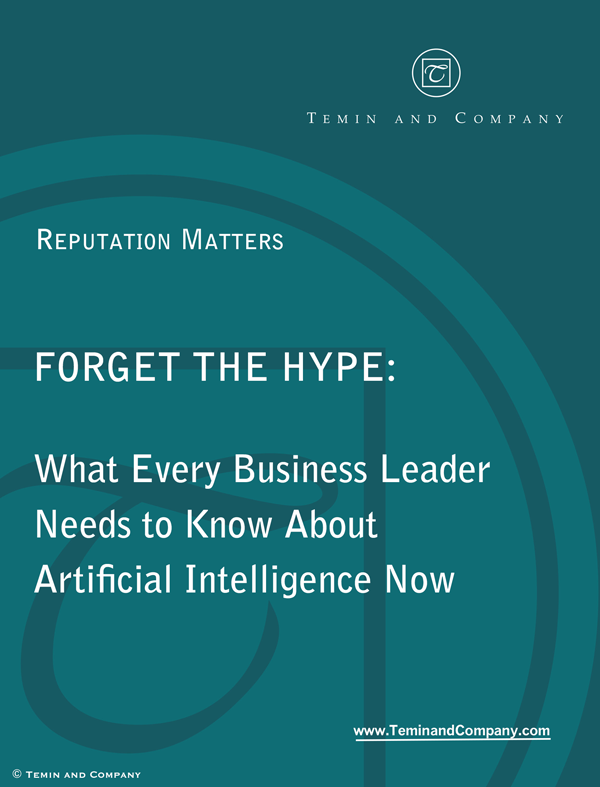Thought Leadership
White Papers»
"Reputation Matters" White Papers seek to offer deeper insight on a wide range of topics we help clients address.
Rebuilding Trust in the Financial Markets
Chapter Excerpt, Trust Inc, November 1, 2013
This chapter by Davia Temin in Trust Inc.: Strategies for Building Your Company’s Most Valuable Asset, contains a prescription for how to rebuild trust in the financial markets, even after five years.
REBUILDING TRUST IN THE FINANCIAL MARKETS
Only 22% of Americans trust the financial system, Chicago’s “Financial Trust Index” has just reported. But it doesn’t take an index to tell us that public trust in the financial services industry, as well as the markets themselves, is dangerously compromised. The headlines say it all:
Where Banking Crisis Raged, Trust Is Slow to Return (The New York Times)
Deutsche Bank Says Generation Needed to Regain Trust (Bloomberg)
The Return of the ‘Rip-Off Factor’ on Wall Street (The New York Times)
Losing Faith in American Institutions (The New York Times)
Why You Shouldn’t Trust Any Libor Rate UBS Touched (The Wall Street Journal)
Another Annus Horribilis for Europe’s Banks (The Wall Street Journal)
Why I’m Leaving Goldman Sachs (The New York Times)
Big, Rich, and Wobbly: Wall Street Banks Are Still Sicker Than You Think (The Atlantic)
Though one might think that these headlines ran at the height of the financial crisis – 2008 and 2009 – they did not. They – and thousands more like them – are actually from 2013 and late 2012. Not much has changed in five years.
Clearly, the financial services industry has not taken the steps needed to repair public trust shattered during the crisis. In fact in many instances, banks and other financial institutions have exacerbated the pain of their customers, continuing the diminution of trust rather than staunching it.
Individuals – already devastated by losses of savings, homes, jobs, lifestyles, and dignity during the financial crisis – found banks not only illegally foreclosing on their mortgages, and “robo-signing” documents, they also saw a raft of new bank fees being levied on their every banking activity. “Death by a thousand cuts” took on new meaning as consumers puzzled over the new charges on their bank and credit card statements.
Institutional clients have been deluged by press articles claiming that their investment banks are self-dealing – putting clients’ welfare second to the banks’ own welfare – not only during the crisis itself, but thereafter. One disaffected Goldman Sachs banker stated, in an open letter to the public on why he was resigning, that his fellow bankers often called their clients “muppets.” And, the government’s dive into banks’ email records has supported many of these claims.
So, despite a broad stock market rally since the financial crisis officially ended, public animosity towards banks and investment banks has not abated. In fact, if anything, it has deepened. And non-banks such as Wal-Mart and Facebook – in which consumers have far greater trust – have begun to fill in the void. Is this the death knell of the financial services industry? Have we gone from “Too Big to Fail,” to “Failure is Inevitable?”
What can be done? And, even if banks have the will, is it possible to rebuild trust in financial institutions today?
Of course it is – IF the will exists. America loves nothing so much as a “comeback kid.” And a company, a politician, or even an entire industry CAN rebuild public trust, as long as they are willing to truly, authentically learn the lessons that are needed, and reform.
Trust is both forged and destroyed in crucible moments. And while it could be said that the financial industry has been going through a refiner’s fire, it has not yet emerged from the oven, even after five years, because it has not shown it has learned the lessons needed. It has not reformed voluntarily, believably, and enduringly. So, whether it succumbs to the flames, or can emerge finer, stronger, and wiser all rests on the will of the industry itself.
Social scientists such as Harvard’s Iris Bohnet tell us that trust is the lubricant – or glue – of civil society and economic growth. Trust underlies consumer, business, and counterparty confidence, and allows us to interact, engage, and trade with one another even in the absence of formal contract enforcement. In fact, you could almost call trust our world’s shadow currency: it enables the smooth flow of money, trade, production, and economic growth around the world.
Globally, it is positively correlated with higher per capita income and growth rates, better functioning governments, increased happiness, and a decrease in crime.
Distrust of course, is associated with the exact opposite – economic stagnation, decreased democratic stability, lower individual income, increased crime, inferior student achievement, and decreased health and happiness.
Frank Navran and Fred Garcia define trust as: “The natural consequence of promises fulfilled, of predictions that come true, and of values lived. Trust is lost when promises are unfulfilled; when predictions fail to come true; and when one’s behavior is contrary to one’s stated values.”
Worse, once a person’s trust is violated through deception, it is harder and takes far longer to restore.
And, when people are hurting – or continue to hurt – they cannot trust.
These are just some of the issues facing the financial services industry, as it seeks to rebuild trust. It is a complex algorithm of issues that developed over time, converged into a full-blown crisis, and that never have been completely resolved. Worse, many of the steps that we know are critical to the rebuilding of trust – taking responsibility for bad actions, apologizing, reparation, voluntary reform, and then strict compliance to a new set of standards – have not happened yet, and may never happen.
So, I believe that in order to grapple with a complex, systemic failure such as the financial services industry has experienced takes a combination of disciplines, including crisis management, psychology, social science, negotiation skills, communications, and branding and marketing.
The first lessons come from crisis management. And like every crisis I have ever worked with, or know of, it all starts with DENIAL.
Whether it’s a board, senior leadership, rank and file, the public or individuals, our first impulse when we get a whiff of danger, or when things start to go seriously south, is denial:
“This cannot be happening. Or if it is happening, it isn’t happening to me. Or, if it is happening to me, then it is not really that bad. Or, if it is that bad, no one will notice; or, we’ve squeaked by before, we can do so again; it will pass with the news cycle; we do not need to respond; we do not need to do anything differently, or even acknowledge the problem – just stay the course, just hang in there.” etc.
These are the first internal monologues that occur during times of crisis. This is normal, but what determines the trajectory of how a crisis unfolds is how quickly we exit our state of denial, acknowledge the problem, apologize if need be, promise to fix it, and begin to take action that fulfills that promise and addresses the root causes, as well as the perception of the problem…and then communicate, and over communicate, to every constituency involved.
The longer this takes to do, the worse the crisis unfolds, and the more trust is lost.
In our 24×7 news cycle, an hour turns into a second, so action must be immediate, resonant, and emotionally “authentic,” and must at least appear to be transparent. Solutions must seem to home-grown, not legislated or imposed. And, they must pass the authenticity test imposed upon them by social media.
“The loss of trust in banks is accentuated by the social media effect,” said Brett King in his 2010 Huffington Post article What Loss of Trust in Banks Really Means. “What we’ve seen in effect is the perfect storm…but interestingly most bankers don’t have a clue as to why this decline in trust has been so ‘harsh’…The perfect storm was not just the Global Financial Crisis, but also shifting consumer behaviors and in particular the role of social media in forming public opinions…in April 2009 a Nielsen survey showed that social media had already become the most dominant force in creating brand perception around trust. The problem for banks is that they generally aren’t participating in social media. Thus, their brands have been hijacked by customers who just aren’t happy.”
Denial, therefore, not only gets us into crises, it also keeps us from getting out of them if it stops us from taking needed action.
The more denial puts us on a collision course with reality – the reality that is apparent to the public – the more the public feels deceived and the more trust is destroyed.
The public needs to assign blame, and it is still doing it around the world.
Additionally, social science does tell us that the worst betrayal of trust is felt when class or status lines are crossed: “lower classes” fear most receiving an inferior outcome compared to those of a higher status. Therefore, when it comes to Wall Street bonuses, those of “lower status” feel disproportionately angry when upper “classes” get outsized bonuses. That is why so much anger is exhibited around Wall Street bonuses – not just perceived inequities, but class-based inequities, as well.
And the financial services industry has acted, until very recently, fairly insensitively to the rest of the country’s and world’s pain.
So what can the financial services industry do now?
The range of possibilities has existed from the early days of the crisis up until this moment, of course, and it goes from the least to the most activist. But, it is a fairly good bet that the less active the solution, even now, the longer it will take to rebuild trust, and the more active, the faster the trust will rebuild.
Alternatives include:
1. Do nothing. Over time, if all recovers, things will limp back to normal. If there is a loss of trust, so be it; people still have to do something with their money. This seems to have been adopted by many financial institutions over the past five years.
2. Say the “right” things, but don’t really change. Put together the “right” kinds of press releases and ads – tout transparency, innovation, diligence, accuracy, restructuring – but don’t actually do much, or at least, do the minimum. This, too, seems familiar.
3. Or, actually tow the line, reform, recommit to clients and the public, and then perform according to plan.
At this time in our recovery, clearly options 1 and 2 have been tried, and have failed. In order to fully embrace option 3, here are my suggestions for a game plan for the financial services industry to truly rebuild trust:
1. Short-circuit denial. Stop staying silent. Take the right kind of responsibility and authentically apologize in appropriate ways, and start putting in fixes. And implement them. (Sometimes this can mean bucking the lawyers who only want one to “neither admit nor deny” culpability. It is the wise leader who knows when to follow the advice of his or her attorneys, and when to disregard it.)
2. Start to see and talk about the world from the point of view of the “other” – in this case, clients. Demonstrate in public communications that it is not “all about us,” and not even all about profitability or even shareholder value. It is about the customer. Innovate financial solutions to help those in need, do not just walk away from them.
3. Acknowledge the pain of the populace (empathize), be sensitive to it, and share it. Demonstrate “good will.” Don’t do this only when forced to.
4. Demonstrate “reciprocity.” Reciprocity is defined as: “an internalized norm inducing people to respond like to like – to kindness with kindness; unkindness with unkindness, even if it is not in a person’s material self-interest to do so…” Make fixes commensurate – or more than commensurate – with the pain of others, and be willing to share in others’ pain, not stay exempt.
5. Reparation must hurt! There is a complex equation that the public seems to demand: it needs to exact double or triple the pain of the aggrieved from the party responsible. In other words, the public wants to see blood first, and then they can forgive. One idea would be for Wall Street to pool 5%, 10%, or 15% of every bonus granted, and use the aggregate to bail out those about to lose their homes in each of the fifty states. A lottery could be held to choose the beneficiaries, and the public would see bankers lose remuneration, in order to help those in need. Not a bad way to build some good will.
6. Start acting like the good citizen…and living the same way. One bank, Citizens Financial Group, not only created a credo of good citizenship and good banking for all of its bankers, and all of its activities, it defined all the ways it would give back to the community. Only then did it set as its tagline: Good Banking is Good Citizenship. Because it walked the walk before ever creating its advertising, it was believed, trusted, and holds one of the highest trust scores of any U.S. bank.
7. Initiate an ongoing series of two-way communications with the public – through both traditional and social media. But make these communications real, personal and important – never robotic, formulaic, or seemingly unfeeling.
8. Communicate not only to the public, writ large, but to many small groups, as well as one-on-one. Research proves that it is easier to rebuild trust with small groups than large ones.
9. Manifest real leadership – walk the talk. Show that lessons have been learned, and don’t exhibit the same behavior that was problematic in the first place. Do not let the same thing happen again.
The public and the press may be willing to forgive over time; they may be willing to suspend distrust over time, and they may be willing to build trust anew, over time. But research has found that if lying recurs, if denial recurs, if totally selfish behavior recurs, that trust may well be gone forever.
And a world, or an industry, or a financial system based on perpetual distrust will surely not continue. So, this is a case for survival, of the very financial industry itself.
Davia Temin is President and CEO of Temin and Company, a boutique management consultancy focused on international reputation, risk, and crisis management, marketing and media strategy, thought leadership, and high-level leadership and communication coaching. The firm helps to create, enhance and save reputations for a wide array of corporations and other institutions at the board, corporate, product and funding levels.
Ms. Temin writes a Forbes.com column called “Reputation Matters” and is a contributor to The Huffington Post and American Banker. For more information, visit www.teminandcompany.com and follow her on Twitter @DaviaTemin.
White Papers»
"Reputation Matters" White Papers seek to offer deeper insight on a wide range of topics we help clients address.




